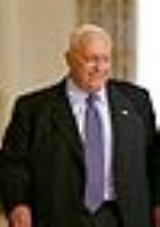
Israel prime ministerial election, 2001
Encyclopedia
Elections for Prime Minister were held in Israel
on 6 February 2001 following the resignation of the incumbent, Labour's Ehud Barak
. Barak stood for re-election against Likud
's Ariel Sharon
.
It was the third and last Prime Ministerial election (separate elections were scrapped before the next Knesset elections in 2003), and the only one which was not held alongside simultaneous Knesset elections.
Voter turnout was 62.3%, the lowest turnout for any national election held in Israel. The low turnout was at least partially due to many Israeli Arabs
boycotting the poll in protest at the October 2000 events
in which 12 Israeli Arabs were killed by the police. Other possible reasons are Sharon's massive advantage in advance polls, and the lack of enthusiasm of Barak supporters due to his perceived failings, notably, the failure of the 2000 Camp David talks with the Palestinians, and the "turbine affair" in which Barak yielded to the religious parties' pressure, violating previous promises.
The result was a national unity government
involving eight parties; Labour, Likud, Shas
, the Centre Party
, the National Religious Party
, United Torah Judaism
, Yisrael BaAliyah, the National Union
and Yisrael Beiteinu. The government initially had 26 ministers, though this later rose to 29.
New Knesset elections were called in 2003, which resulted in a landslide victory for Sharon's Likud.
Israel
The State of Israel is a parliamentary republic located in the Middle East, along the eastern shore of the Mediterranean Sea...
on 6 February 2001 following the resignation of the incumbent, Labour's Ehud Barak
Ehud Barak
Ehud Barak is an Israeli politician who served as Prime Minister from 1999 until 2001. He was leader of the Labor Party until January 2011 and holds the posts of Minister of Defense and Deputy Prime Minister in Binyamin Netanyahu's government....
. Barak stood for re-election against Likud
Likud
Likud is the major center-right political party in Israel. It was founded in 1973 by Menachem Begin in an alliance with several right-wing and liberal parties. Likud's victory in the 1977 elections was a major turning point in the country's political history, marking the first time the left had...
's Ariel Sharon
Ariel Sharon
Ariel Sharon is an Israeli statesman and retired general, who served as Israel’s 11th Prime Minister. He has been in a permanent vegetative state since suffering a stroke on 4 January 2006....
.
It was the third and last Prime Ministerial election (separate elections were scrapped before the next Knesset elections in 2003), and the only one which was not held alongside simultaneous Knesset elections.
Voter turnout was 62.3%, the lowest turnout for any national election held in Israel. The low turnout was at least partially due to many Israeli Arabs
Arab citizens of Israel
Arab citizens of Israel refers to citizens of Israel who are not Jewish, and whose cultural and linguistic heritage or ethnic identity is Arab....
boycotting the poll in protest at the October 2000 events
October 2000 events
The October 2000 events were a series of protests in Arab villages in northern Israel in October 2000 that turned violent, escalating into clashes between Israeli Arabs and the Israel Police and ending in the deaths of demonstrators.The Or Commission was established to investigate the police...
in which 12 Israeli Arabs were killed by the police. Other possible reasons are Sharon's massive advantage in advance polls, and the lack of enthusiasm of Barak supporters due to his perceived failings, notably, the failure of the 2000 Camp David talks with the Palestinians, and the "turbine affair" in which Barak yielded to the religious parties' pressure, violating previous promises.
Results
Aftermath
After winning the election, Sharon needed to form a government in the Knesset. However, because there had been no Knesset elections, Labour remained the largest party.The result was a national unity government
National unity government
A national unity government, government of national unity, or national union government is a broad coalition government consisting of all parties in the legislature, usually formed during a time of war or other national emergency.- Canada :During World War I the Conservative government of Sir...
involving eight parties; Labour, Likud, Shas
Shas
Shas is an ultra-orthodox religious political party in Israel, primarily representing Sephardic and Mizrahi Haredi Judaism.Shas was founded in 1984 by dissident members of the Ashkenazi dominated Agudat Israel, to represent the interests of religiously observant Sephardic and Mizrahi ...
, the Centre Party
Centre Party (Israel)
The Centre Party , originally known as Israel in the Centre, was a short-lived political party in Israel. Formed in 1999 by former Defense Minister Yitzhak Mordechai, the aim was to create a group of moderates to challenge both Binyamin Netanyahu on the right and opposition leader Ehud Barak's...
, the National Religious Party
National Religious Party
The National Religious Party ) was a political party in Israel representing the religious Zionist movement. Formed in 1956, at the time of its dissolution in 2008, it was the second oldest surviving party in the country after Agudat Yisrael, and was part of every government coalition until 1992...
, United Torah Judaism
United Torah Judaism
United Torah Judaism is an alliance of Degel HaTorah and Agudat Israel, two small Israeli Haredi political parties in the Knesset. It was first formed in 1992.The two parties have not always agreed with each other about policy matters...
, Yisrael BaAliyah, the National Union
National Union (Israel)
The National Union is an alliance of nationalist political parties in Israel. In the 2009 elections the National Union consisted of four parties: Moledet, Hatikva, Eretz Yisrael Shelanu, and Tkuma.-Background:...
and Yisrael Beiteinu. The government initially had 26 ministers, though this later rose to 29.
New Knesset elections were called in 2003, which resulted in a landslide victory for Sharon's Likud.
External links
- 2001 Election for Prime Minister Knesset website

